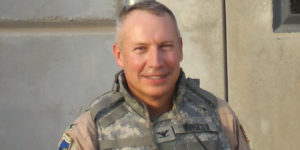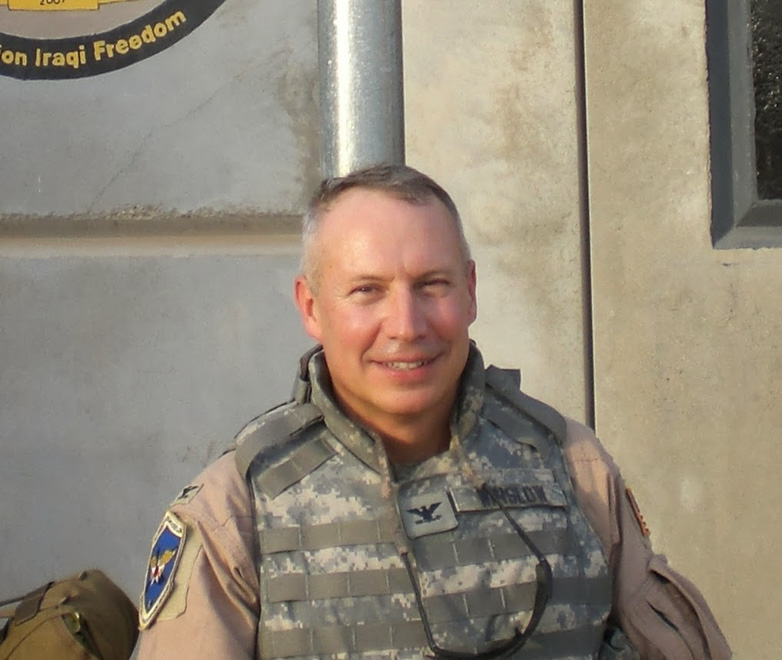Stanford Professor of Medicine Dean Winslow was set to become the Pentagon’s top health official for the Trump administration. But he wrecked his chances during his confirmation hearing by, as he puts it, “blurt[ing] out what was in my heart.”
Winslow’s hearing before the Senate Armed Services Committee took place in early November, less than 48 hours after a mass shooting in Sutherland Springs, Texas, left 26 dead and wounded 20 others. Senator Jeanne Shaheen (D-NH) had asked Winslow about the military discharge status of the shooter when, as part of his answer, Winslow commented on civilian access to semiautomatic assault weapons.

“I’d also like to — and I may get in trouble with other members of the committee — just say how insane it is that, in the United States of America, a civilian can go out and buy a semiautomatic assault rifle, like an AR-15,” he said.
As he feared, Winslow did get in trouble: The committee put his confirmation process on indefinite hold until Winslow ultimately withdrew his name from consideration in mid-December, a move that he publicly announced in a Dec. 20 op-ed in the Washington Post.
While Winslow’s written statement on therapeutic abortions also ruffled the feathers of some committee members and required clarification, Winslow was told that his comments on gun control were what ultimately doomed his confirmation process.
“I’m very disappointed that I won’t be able to serve under Secretary [of Defense Jim] Mattis and serve in the very important position of assistant secretary of defense for health affairs,” Winslow told The Daily. “The fact is, I stand by what I said at the hearing.”
Winslow says he was also surprised that members of the committee felt so strongly about his comments on civilian access to semiautomatic assault weapons that they would not move forward with his confirmation. The rest of the developed world has already recognized the dangers of such access and has put in place common-sense restrictions, he argued.
“It’s a sad comment that unequivocal, unrestricted support of ownership of any type of a weapon has almost become a litmus test for serving in government,” Winslow said.
Nomination
Leading up to his nomination, Winslow had been practicing medicine for over 40 years, including as an Air Force colonel and flight surgeon, positions that sent him to the Middle East on six deployments. Though he has been on Stanford’s faculty since 1998, he joined the faculty full-time in 2013, following a decade of work at the Santa Clara Valley Medical Center, where he served as the chair of medicine for two years. He became the vice chair of Stanford’s department of medicine in 2015, the same year that he retired from the Air National Guard.
It was at Stanford where Winslow became friends with now-Secretary of Defense Jim Mattis, who also arrived at campus around that same time to work at the Hoover Institution. Winslow was familiar with the retired general prior to his arrival to Stanford: Mattis had been Winslow’s “boss’s boss” during several of Winslow’s deployments to the Middle East.
“Most people would consider him to have been the very best combat leader of our generation,” Winslow said. “Anybody who is current military or former military would give their right arm to work for General Mattis.”
Once Mattis was nominated for secretary of defense, Winslow says he called Mattis to congratulate him on his selection and offered to serve under him in the Pentagon. Mattis later asked him to officially apply for the position of assistant secretary of defense for health affairs, which entails heading the military healthcare system at home and in theater. Afterward, Winslow went through an interview process and background check before President Donald Trump announced his intent to nominate the doctor on Sept. 2.
Hearing
Over halfway through Winslow’s hearing in front of the Senate Armed Services Committee, Senator Shaheen — dismayed that the shooter from Sutherland Springs, who had a history of domestic violence that the Air Force did not report to the National Instant Criminal Background Check System, had received a bad conduct and not dishonorable discharge from the Air Force — asked Winslow whether a dishonorable discharge would have been the proper type of release.
Winslow answered by discussing the Air Force not reporting the domestic violence incident as a “single point [of] failure” before saying that civilian possession of semiautomatic weapons is “insane.”
He was then interrupted by Senator John McCain (R-AZ), the committee chairman, who said that Winslow was speaking on something not in his “area of responsibility or expertise.”
Winslow disputes that assessment.
“Senator McCain was correct in that it was completely outside my area of responsibility,” he said. “However I do disagree with him [in that] this certainly is within my area of expertise as someone who’s done six combat tours in Iraq and Afghanistan.”
In his op-ed, Winslow pointed to his expert rating in the M-9 pistol and M-16 rifle, in addition to his experiences on his overseas deployments, as evidence of his knowledge on weapons. He also wrote that he views easy access to semiautomatic weapons as a “public-health issue that, as a doctor, I felt compelled to bring to the Senate’s attention.”
Winslow says he brought up civilian access to semiautomatic assault weapons because he intended to make the larger point that one should also look at other issues that contributed to the shooting besides the type of discharge the Air Force gave the shooter and the Air Force’s failure to report his domestic violence incident. In cutting him off, McCain prevented him from making that point, Winslow said.
After McCain’s interruption, Shaheen clarified that she was concerned that the Department of Defense does not view domestic violence as a crime like the civilian system does and that she wanted Winslow to take that issue on if he were to be confirmed. Winslow responded that the type of discharge one receives is more relevant to the work of the Judge Advocate General’s Corps, the military’s justice branch, than his post, but later said he would raise the issue up his chain of command.
Senator Shaheen’s and Senator McCain’s offices did not respond to requests for comment for this article.
Held confirmation, withdrawal
Two days following the hearing, the committee voted to move along the confirmation process of the three other nominees who testified alongside Winslow, all of whom were confirmed by the full Senate a week later.
Winslow’s confirmation, however, was put on hold. When speaking to reporters, McCain cited members’ concerns over Winslow’s comments on guns and his written statement on access to abortion for women in the military. McCain said that members of the committee had additional questions for Winslow on those topics before moving forward with his confirmation process and that Winslow would have the chance to make his case.
In Winslow’s written answers to a set of advanced policy questions, which he submitted prior to the hearing, Winslow said he believes the military should provide therapeutic abortion services for women — a medical term for abortions that occur when the mother’s life is in danger.
He clarified his answer when asked about it during the hearing, defining therapeutic abortions for committee members and saying he intended to convey that he would not get in the way of federal law, which for decades has allowed military funding and access to abortions only in certain circumstances, including if the mother’s life is in danger.
In addition to reprimanding Winslow for his comments on guns, McCain also responded to Winslow’s stance on abortion after the hearing, saying “I happen to be pro-life and I happen to believe what he said was not pro-life.”
Nevertheless, Winslow says he was told his clarification on the abortion issue was satisfactory, and that the major issue some senators had with him stemmed from his comments on civilian access to semiautomatic assault weapons.
In early December, McCain told the Washington Examiner that despite Winslow’s clarification, members of the committee still had concerns and that he was uncertain whether Winslow’s nomination would ultimately be reported by the committee to the full Senate. Up until his withdrawal, Winslow says he had been in contact with the Pentagon legislative affairs staff several times a week.
With no end to the hold in sight, Winslow called Secretary Mattis on Dec. 10 to express his willingness to withdraw his name from consideration so that the position could be filled without further delay.
“I was willing to withdraw my name from consideration since I thought it was very important that [Mattis] has an assistant secretary of defense for health affairs,” Winslow said. “Our soldiers, sailors, airmen, Marines and their families deserve that, and I did not want to be the one standing in the way of filling that position.”
Not seeing a clear path forward for Winslow’s confirmation, Mattis accepted his withdrawal. President Trump has yet to announce a new nominee for the position.
With his nomination withdrawn, Winslow will continue teaching and practicing medicine at Stanford.
“I love being a doctor and I love teaching at Stanford, so it was maybe in a way a blessing in disguise, even though I’m sad that I’m not going to be working for General Mattis,” Winslow said. “That would have been a really wonderful job and I think I could have done a good job in that position.”
Contact Alexa Philippou at aphil723 ‘at’ stanford.edu.
This post has been updated to clarify the type of weapons referred to by Winslow.
